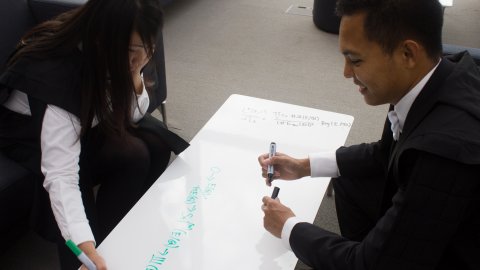Finding and Imposing Qualitative Properties in Data
Abstract
Data analysis techniques are often highly domain specific - there are often certain patterns which should be in certain types of data but may not be apparent in data. The first part of the talk will cover a technique for finding such patterns through a tool which combines visual analytics and machine learning to provide insight into temporal multivariate data. The second half of the talk will discuss recent work on imposing high level geometric structure into continuous optimizations including deep neural networks.
Improving the scalability of derivative-free optimisation for nonlinear least-squares problems
Abstract
In existing techniques for model-based derivative-free optimisation, the computational cost of constructing local models and Lagrange polynomials can be high. As a result, these algorithms are not as suitable for large-scale problems as derivative-based methods. In this talk, I will introduce a derivative-free method based on exploration of random subspaces, suitable for nonlinear least-squares problems. This method has a substantially reduced computational cost (in terms of linear algebra), while still making progress using few objective evaluations.
Multiple scales analysis of a conductive-radiative thermal transfer model
Abstract
Multiple scales analysis is a powerful asymptotic technique for problems where the solution depends on two scales of widely different sizes. Standard multiple scales involves the introduction of a macroscale and microscale which are assumed to be independent. A common (and usually acceptable) assumption is that when considering behaviour on the microscale, the macroscale variable can be taken as constant, however there are instances where this assumption is not valid. In this talk, I will explain one such situation, that is, when considering conductive-radiative thermal transfer within a solid matrix with spherical perforations and discuss the appropriate measures when converting the radiative boundary condition into multiple-scales form.
11:00
Hilbert's Fifth Problem
Abstract
Hilbert's fifth problem asks informally what is the difference between Lie groups and topological groups. In 1950s this problem was solved by Andrew Gleason, Deane Montgomery, Leo Zippin and Hidehiko Yamabe concluding that every locally compact topological group is "essentially" a Lie group. In this talk we will show the complete proof of this theorem.
11:30
The (non-uniform) Hrushovski-Lang-Weil estimates
Abstract
In 1996 using techniques from model theory and intersection theory, Hrushovski obtained a generalisation of the Lang-Weil estimates. Subsequently the estimates have found applications in group theory, algebraic dynamics and algebraic geometry. We shall discuss a geometric proof of the non-uniform version of these estimates.





